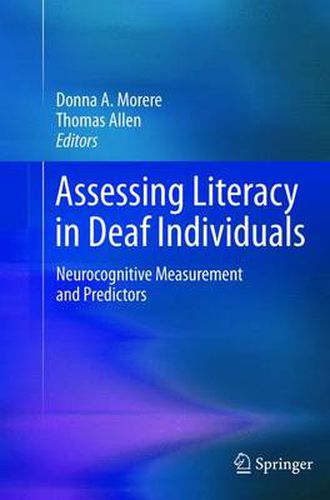Readings Newsletter
Become a Readings Member to make your shopping experience even easier.
Sign in or sign up for free!
You’re not far away from qualifying for FREE standard shipping within Australia
You’ve qualified for FREE standard shipping within Australia
The cart is loading…






This title is printed to order. This book may have been self-published. If so, we cannot guarantee the quality of the content. In the main most books will have gone through the editing process however some may not. We therefore suggest that you be aware of this before ordering this book. If in doubt check either the author or publisher’s details as we are unable to accept any returns unless they are faulty. Please contact us if you have any questions.
Humans’ development of literacy has been a recent focus of intense research from the reading, cognitive, and neuroscience fields. But for individuals who are deaf-who rely greatly on their visual skills for language and learning-the findings don’t necessarily apply, leaving theoretical and practical gaps in approaches to their education.
Assessing Literacy in Deaf Individuals: Neurocognitive Measurement and Predictors narrows these gaps by introducing the VL2 Toolkit, a comprehensive test battery for assessing the academic skills and cognitive functioning of deaf persons who use sign language. Skills measured include executive functioning, memory, reading, visuospatial ability, writing fluency, math, and expressive and receptive language. Comprehensive data are provided for each, with discussion of validity and reliability issues as well as ethical and legal questions involved in the study. And background chapters explain how the Toolkit was compiled, describing the procedures of the study, its rationale, and salient characteristics of its participants. This notable book:
Describes each Toolkit instrument and the psychometric properties it measures.
Presents detailed findings on test measures and relationships between skills. Discusses issues and challenges relating to visual representations of English, including fingerspelling and lipreading. Features a factor analysis of the Toolkit measures to identify underlying cognitive structures in deaf learners. Reviews trends in American Sign Language assessment.
Assessing Literacy in Deaf Individuals is an essential reference for researchers, graduate students, clinicians, and other professionals working in the field of deafness and deaf education across in such areas as clinical child and school psychology, audiology, and linguistics.
$9.00 standard shipping within Australia
FREE standard shipping within Australia for orders over $100.00
Express & International shipping calculated at checkout
This title is printed to order. This book may have been self-published. If so, we cannot guarantee the quality of the content. In the main most books will have gone through the editing process however some may not. We therefore suggest that you be aware of this before ordering this book. If in doubt check either the author or publisher’s details as we are unable to accept any returns unless they are faulty. Please contact us if you have any questions.
Humans’ development of literacy has been a recent focus of intense research from the reading, cognitive, and neuroscience fields. But for individuals who are deaf-who rely greatly on their visual skills for language and learning-the findings don’t necessarily apply, leaving theoretical and practical gaps in approaches to their education.
Assessing Literacy in Deaf Individuals: Neurocognitive Measurement and Predictors narrows these gaps by introducing the VL2 Toolkit, a comprehensive test battery for assessing the academic skills and cognitive functioning of deaf persons who use sign language. Skills measured include executive functioning, memory, reading, visuospatial ability, writing fluency, math, and expressive and receptive language. Comprehensive data are provided for each, with discussion of validity and reliability issues as well as ethical and legal questions involved in the study. And background chapters explain how the Toolkit was compiled, describing the procedures of the study, its rationale, and salient characteristics of its participants. This notable book:
Describes each Toolkit instrument and the psychometric properties it measures.
Presents detailed findings on test measures and relationships between skills. Discusses issues and challenges relating to visual representations of English, including fingerspelling and lipreading. Features a factor analysis of the Toolkit measures to identify underlying cognitive structures in deaf learners. Reviews trends in American Sign Language assessment.
Assessing Literacy in Deaf Individuals is an essential reference for researchers, graduate students, clinicians, and other professionals working in the field of deafness and deaf education across in such areas as clinical child and school psychology, audiology, and linguistics.